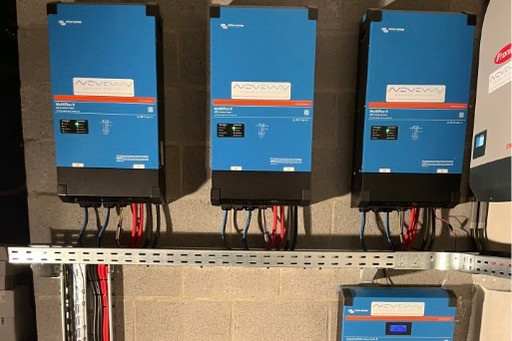Whilst energy costs have risen considerably in recent years, Noveway is creating sparks. Founded in Belgium in 2016 before expanding to Luxembourg--setting up in Doncols near Wiltz less than a year ago--the company founded by Matthieu Wuidar initially specialised in the installation of photovoltaic panels. It was, for example, the company that installed the 1,188 solar panels on the roof of Co-Labor in Bertrange last autumn, which is expected to save tens of thousands of euros a year.
But beyond the photovoltaic panels, the company--which employs 20 people in both countries, including engineers--has gone from strength to strength and developed unique expertise in the integration of smart batteries with photovoltaic panels. This enables partial or total energy independence, aimed at both industrial and private customers. It’s a real revolution in this market, and brings with it the promise of reducing energy bills.
Already more than 30 of these “revolutionary” batteries have been installed in the two countries. Produced by the Belgian company Belup, coupled with the installation of photovoltaic panels and a cogeneration system, they enable a site to operate autonomously, i.e., without the need for a connection to the grid. This connection can be costly in some cases, for example, for an industrial site. However, to make such installations profitable, which are difficult to put a figure on in this article because they are tailor-made, “you need to allow six to seven years for small batteries and five to six years for larger batteries,” the CEO explained to several Belgian news outlets.
These “famous batteries”--the capabilities of which the company boasts--make it possible to optimise the energy produced by photovoltaic installations, any surplus of which can be stored and not fed back into the grid. They operate on a plug-and-play system and can be plugged directly into a conventional electrical socket. Design is also a focus for the company. An intelligent management system prevents waste and reduces overvoltage and overloading of the grid, with a monitoring system that allows consumers to see production in real time. Even more innovative, these batteries are equipped with V2X technology, enabling energy from vehicles to be fed directly into the domestic grid. However, the system proposed by Noveway still leaves room for improvement. They can encourage self-consumption, up to around 55%, but energy storage in the batteries remains limited, at around two days in the case of a domestic installation.
It’s a small revolution in a market where Noveway wants to position itself as a forerunner. In 2023, the Marche-en-Famenne-based company achieved record sales of €7m. In January 2023, it even won the innovation prize at the Batimoi trade fair devoted to construction and renovation in Wallonia.
This article was originally published in .
